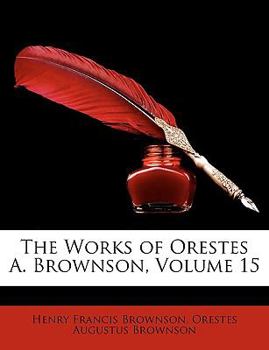The Works of Orestes A. Brownson; Volume 15
The Works of Orestes A. Brownson, Volume 15 presents a comprehensive collection of writings from the influential American philosopher, theologian, and social critic Orestes Augustus Brownson (1803-1876). Edited by his son, Henry Francis Brownson, this volume offers insight into Brownson's evolving intellectual journey and his profound engagement with the pressing issues of his time. A convert to Catholicism, Brownson became a prominent voice in American religious and intellectual life, known for his incisive commentary on politics, philosophy, and culture.
This collection showcases the depth and breadth of Brownson's thought, reflecting his commitment to articulating a distinctively American Catholic perspective. Readers will encounter essays and articles exploring themes such as democracy, social justice, religious authority, and the relationship between faith and reason. The Works of Orestes A. Brownson remains a valuable resource for scholars and anyone interested in the intellectual history of 19th-century America and the ongoing dialogue between faith and culture.
This work has been selected by scholars as being culturally important, and is part of the knowledge base of civilization as we know it. This work was reproduced from the original artifact, and remains as true to the original work as possible. Therefore, you will see the original copyright references, library stamps (as most of these works have been housed in our most important libraries around the world), and other notations in the work.
This work is in the public domain in the United States of America, and possibly other nations. Within the United States, you may freely copy and distribute this work, as no entity (individual or corporate) has a copyright on the body of the work.
As a reproduction of a historical artifact, this work may contain missing or blurred pages, poor pictures, errant marks, etc. Scholars believe, and we concur, that this work is important enough to be preserved, reproduced, and made generally available to the public. We appreciate your support of the preservation process, and thank you for being an important part of keeping this knowledge alive and relevant.





